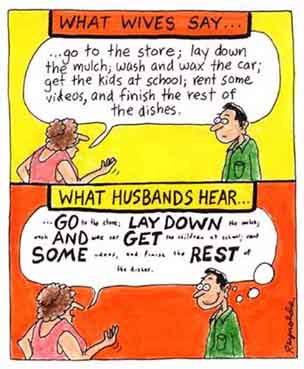Communication is at a minimum two people talking. One sender and one receiver exchanging thoughts, ideas, or just friendly banter. That’s known as communicating. How tough can that really be? Apparently, it is tough cause miscommunication often times takes the blame for two people banging heads. Do we really need an interpreter or 3rd party mediator? I’m often left wondering why they don’t understand the words coming out of my mouth.
Not all people communicate alike. What works for one person won’t necessarily work for another. I like communicating in person or over the phone. Some people prefer to email. Some think writing and reading an email is a waste of time when we have phones. Others find that technology has replaced interpersonal communication and relationships. And some would like to go back to black and white movies with no sound. These are all ways of communicating.
I used to think I was a good at communicating and it was others who just didn’t understand me. I actually still think this from time to time and I than have to take a step back and remember that it takes two people dialoguing about something. It’s a two way street of talking and listening. If one walks away from it confused or with the wrong interpretation, than good and effective communication did not happen. After enough of these experiences I realized that being a good communicator is more than just speaking articulately and clearly. I needed to be aware of the other person’s communicating style and work with that. I also needed to listen better. We’re all unique and need to be communicating differently.
Remember that what happens during the conversation is as equally important as what the person takes away from it.
Here are 8 key points I try to remember on effective communication for home, work, friendships, relationships…….
1. Everyone is unique. You may be a great communicator with your mom, but with your girlfriend, wife, sister and others in your life you probably need to adjust. Everyone is different and with that means they’re communicating differently. Some people are very expressive with their face and hands. Some don’t move at all. Some use big words. Some want every single detail when another person wants as few as possible. Some of us take a second to process what we’re hearing while others don’t need to. And others are straight to the point and always seem to be in a hurry, while another person talks so slow you start thinking about last night’s sports scores.
While we all share similarities, we are all unique. Each of our experiences – life – helps shape who we are, how we see things, and how we communicate. Learn their communication style.
2. The experience is important. What did they take away from the conversation? Do they understand what was said? If they repeated it back would it be the general gist of what was said? Did they enjoy dialoguing with you? When someone comes out of a conversation they shouldn’t walk away confused.
Picture a professor that is so monotone you fall asleep. He may know his area of expertise but because he doesn’t know how to effectively communicate, you end up leaving bored and disengaged.
The communication experience becomes even more important when talking about “tough” subjects. It’s already tough enough to bring it up. I’ve often gone into one of these conversations with a plan, and then walked away wondering if the purpose for the conversation was clearly communicated. Did we even get to the point or is that same tough unresolved issue going to happen again and again and again……When I find myself here it’s normally because I forgot one of the other 7 points.
3. Be responsive. Sometimes your role will be listening to what they have to say. Make the talk your priority by giving them your undivided attention and being an active listener. Ask questions, share your thoughts and provide feedback to let them know you’re listening.
Being physically present does not mean you’re engaged in the conversation.
4. What method of communicating should I use. In person, email, phone, letter or hand signs? Each has its own purpose, time and place. With tough subjects I’ve found my natural instinct was to not talk in person when really this is exactly what needed to happen. For other subjects like appointment reminders or scheduling email and phone might be more appropriate. Letters are good for birthdays, romance, gifts and sometimes to just put mind or heart to paper.
5. I’m just going to be honest and let their feelings fall where they may….This is probably my favorite of what not to do. Unfortunately I’ve been guilty of this on way too many occasions. The message and how it’s communicated is more important than just delivering it and getting it off your chest. If you’re going to bull rush through someone you might as well stay seated. Otherwise you’ll make a mess and be left picking up a lot more pieces. Honesty requires more delicacy.
6. Communication is between two people, not one person with one agenda and one plan. You might have an agenda and plan….but don’t go so fast that you don’t hear what the other person is saying. There is a fine line between proactive and hyperactive. Be flexible and listen.
One’s eagerness to help could overwhelm the other person and this will end up being alarming or offensive instead of insightful.
7. Some people take a little longer to come out of their shell. If you keep talking or pressuring them into speaking, they will never come out. You might think they’re taking too long to get to their point. I’ve definitely thought that before. If that’s their communicating style then be patient and hear them out. They want to tell you something. Is it more important to shorten and rush the conversation than to really hear what they’re trying to say? I’ve been the culprit on both sides of this one. With a plan I’m direct and keep it short….but sometimes it’s emotional and I need time to talk it out. Don’t rush it.
8. Ask questions. There’s nothing wrong with asking questions if you’re not sure they understood or if you need more clarification.
Assumptions are the termites of relationships. Even worse when that assumption spreads through the grapevine and eventually becomes “fact.”
These 8 points are just a few of my own reminders….and trust me I don’t always remember them. With my sister the other day I used my communicating style and not hers to get a point across. I need to remember that just getting my viewpoint across is not more important than the delivery method and her communication style. She walked away offended and I was frustrated at her for not understanding. Sure a few days later we talked it out….I would have preferred though that it didn’t come to this.
We all could use a little bedside manners and it’s our responsibility to work on it. We won’t always get it perfect but let’s not let that scare us from trying.


Nice article. One of the things I try and do is tell stories that parallel the message I’m trying to convey. Sometimes a highly visual or emotional story can get the message across in a few short minutes comparted to hours of debate. Everyone can relate to the fox and the hound if you’re talking about friendship or disappointment when you talk about GCB going off the air.
Good idea, Samer! I like it! I’ve also been one that finds it easy to relate to stories… whether verbally or on screen. It really does help break it down when I can visualize it in my mind and it becomes more personal.
This is a fabulous article for both men and women!!!
Wow! Great insights! Thank you!
Michelle and Jewel, thank you! Glad you enjoyed the read.
Assumptions are not just termites, but they make an ass out of you and me! I would say active listening is a huge part of communication, so make that a focus!
Robert, for sure! You hit the nail on the head. And I totally agree with you on active listening. That’s actually in the pipeline for another article. 🙂
Communication, its the Nuclei that literally binds us all together in someway or another. An aspect of my communication style that I generally try to adopt is one of deliberate gentle intention. This may sound odd and a bit too in-depth but I really feel that communication starts in the heart. It’s often a reflex action with the words that come out of our mouth, however being mindful of the nature of what and how we are trying to communicate remains to be a balancing act of whether we succeed in delivering what we need to or not.
Having our heart prepared around words of affirmation and encouragement can dramatically impact a situation, a person or a generation. This is not a representation of sissy men who tip toe about, rather men who stand for the building up of those around them whether stranger or friend. It’s starts with you and I… and we can all make a difference to those around us through the way we communicate.
Thanks Luke. I love it! I agree that it starts with each of us and we all impact each other in ways we don’t even know. If our hearts really want good communication than we’ll put in the effort to make it happen.
Very insightful, especially about communicating with others from their point of view rather than your own. Difficult to do sometimes but definitely effective and a great skill to have
Thanks for the comment Mike! It definitely is tough; but worth it.